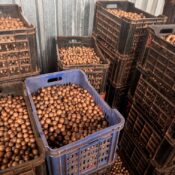
If Trump cancels the growth bill, white farmers in South Africa would be among the sufferers
The United States president claims he wants to help farmers, but his decision to cut aid to South Africa over land reform measures he claims will disadvantage the country’s white minority has sparked concerns that a trade deal might follow.
Agriculture exports such as wine, citrus, soybeans, sugar cane, and beef are subject to tariff-free quotas for South Africa under the Africa Growth and Opportunities Act. Of its $15 billion in yearly trade with the United States, approximately 25% is comprised of the Act. This is in contrast to less than $440 million in U.S. aid in 2023.
According to Wandile Sihlobo, head economist at the Agricultural Business Chamber of South Africa, “it is not clear whether the exporters are Black or White; we don’t record such data,” noting that Black farmers only account for a tenth of farm output.
“The majority of white farmers (are) likely have a significant exposure into the U.S. market,” according to him.
Produce exported to the United States accounts for 4% of agricultural exports, or roughly $450 million annually, according to Sihlobo, while the European Union accounts for 19% and the rest of Africa for 38%.
Citrus fruit and wine farmers, for example, are more vulnerable; in 2022, the former earned $134 million, or 7% of the nation’s total, while the U.S. is its fourth-largest wine market, according to Sihlobo.
Citrus Growers Association president Justin Chadwick declared, “It’s not industry-ending… but it’s very unfortunate,” projecting 120,000 tons of shipments to the United States.
“We (would have) … to find another home for that fruit … and our other markets are pretty full.”
“UNWISE!”
September is the review month for the Africa Growth and Opportunities Act (AGOA). In addition to its genocide lawsuit against Israel and other acts like naval drills with China and Russia, some Republicans seek to penalize South Africa for land reform.
An inquiry was not answered by the U.S. State Department.
Four congressmen wrote to Trump on February 11 urging him to rescind South Africa’s priority benefits under the Act, according to CNBC news.
Senior research fellow Chris Vandome of Chatham House stated, “There is a real likelihood that South Africa is not going to be included in a renewed AGOA.” “Its position is really fragile” .
After decades of voluntary acquisitions, Trump singled out a law passed by President Cyril Ramaphosa last month that permits land expropriation, sometimes without compensation. This law hardly lessens the disparity between the majority Blacks who own 4% of freehold land and the white minority who own 75%.
Farmers claim that the law infringes on their property rights. Republican lawmakers have been lobbied for years by groups that support Afrikaners, the largest white ethnic group and the owners of a substantial portion of privately owned land. They are descendants of Dutch pioneers.
“It wasn’t smart. “They’re hurting themselves,” Ronald Lamola, the foreign minister, told Reuters in a Monday interview. “If AGOA is cut, it’s a cutting of white farmers.”
Trump initially became interested in the land problem in 2018, when Ernst Roets, a lobbyist for the Afrikaner group Afriforum at the time, visited the United States and brought the matter to the attention of Fox News and certain Republican officials. Roets stated that he had “no regrets.”
“We’re hoping for pressure on the South African government to reconsider its destructive policy ideas,” Roets, who is currently affiliated with another lobbying group, stated.
The Act’s repeal won’t affect all agribusinesses.
Marthinus Stander, a board member of the South African Poultry Association, stated that the Act would help poultry farmers who could not “compete with dumping” of subsidized U.S. chicken imports.
All Categories
Recent Posts
Tags
+13162306000
zoneyetu@yahoo.com



